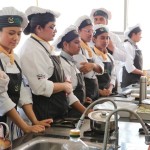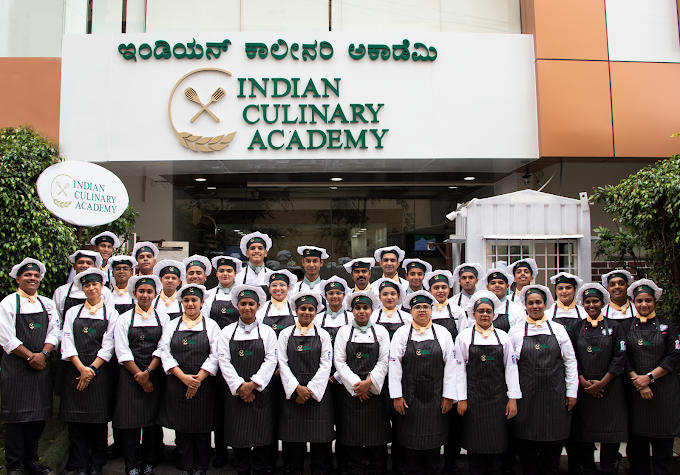Introduction
The culinary arts have always been a cornerstone of culture, tradition, and innovation. From crafting exquisite pastries to perfecting gourmet dishes, chefs bring art to the table with every meal. As the hospitality and food industry continues to grow globally, the demand for skilled and innovative chefs is at an all-time high. While passion and creativity are essential traits, formal education in culinary arts plays a pivotal role in transforming amateur cooks into professional chefs. Chef courses provide structured training, exposure to global cuisines, and the opportunity to refine one’s skills under expert guidance.
Types of Chef Courses
Chef courses are as diverse as the culinary field itself. Whether you're an aspiring chef or a seasoned professional looking to specialize, there’s a course to suit every need and interest.
- Designed for beginners, these courses lay the foundation for essential cooking techniques.
- Key areas include knife skills, understanding basic recipes, and mastering food safety protocols.
- These courses often introduce participants to fundamental concepts like seasoning, plating, and time management in the kitchen.
2. Professional Diploma and Certificate Programs
- Comprehensive programs that offer in-depth training across multiple cuisines and cooking styles.
- Focus on advanced techniques, efficient kitchen operations, and industry-standard practices.
- Often include internships or apprenticeships, providing real-world experience in professional kitchens.
3. Specialized Courses
- Tailored for chefs who want to focus on specific areas of expertise.
- Pastry and Baking: Covers the art of crafting bread, cakes, pastries, and desserts.
- Molecular Gastronomy: Explores the science behind cooking, including innovative techniques like sous-vide and spherification.
- Vegan and Plant-Based Cooking: Focuses on sustainable and health-conscious cooking methods.
- These courses allow chefs to diversify their skills and cater to niche markets.
4. Degree Programs
- Academic courses such as a Bachelor’s in Culinary Arts or Hospitality Management.
- Include a mix of culinary skills, business management, and food science.
- Prepare students for leadership roles in the food and beverage industry, such as executive chefs or restaurant owners.
5. Short-Term Workshops
- Condensed courses that focus on specific skills or cuisines, perfect for hobbyists or semi-professionals.
- Topics range from sushi-making to chocolate artistry, allowing participants to explore their interests without a long-term commitment.
Key Skills Developed
Chef courses not only teach techniques but also instill essential qualities required for success in the culinary world:
- Knife Handling and Preparation: Mastery of cutting techniques ensures precision and efficiency in the kitchen.
- Global Cuisines: Exposure to diverse culinary traditions expands a chef’s repertoire.
- Food Safety and Hygiene: Adherence to stringent safety standards is crucial for any professional kitchen.
- Creativity and Innovation: Developing the ability to craft unique recipes and menus that captivate diners.
- Leadership and Teamwork: Understanding how to manage a kitchen team effectively and maintain harmony in high-pressure environments.
Benefits of Enrolling in Chef Courses
Investing in a chef course offers numerous advantages for aspiring and professional chefs alike:
1. Structured Learning Environment
- Courses provide a well-organized curriculum that ensures comprehensive training in all essential aspects of cooking.
- Hands-on practice allows students to refine their techniques under the guidance of experienced instructors.
2. Access to Professional Tools and Ingredients
- Training facilities often include state-of-the-art kitchens and access to premium ingredients.
- Students gain experience using equipment and materials found in top-tier establishments.
3. Networking Opportunities
- Interaction with peers, mentors, and industry leaders fosters valuable connections.
- Many courses include events or collaborations with renowned chefs and culinary organizations.
4. Pathway to Career Growth
- A recognized qualification significantly enhances employability in prestigious restaurants, hotels, and catering companies.
- Opportunities for internships and placements provide a head start in building a professional career.
Choosing the Right Chef Course
Selecting the right course is crucial for achieving your culinary aspirations. Consider the following:
- Career Goals: Identify whether you want to specialize in a particular cuisine or skill, or aim for a leadership role in the industry.
- Accreditation and Reputation: Choose institutions that are well-regarded and offer recognized certifications.
- Location, Cost, and Duration: Ensure the course fits your budget, schedule, and geographical preferences.
Notable Culinary Schools Worldwide
Some of the most prestigious institutions that offer chef courses include:
- Le Cordon Bleu (France and worldwide branches): Famous for its comprehensive programs in French cuisine and pastry.
- Culinary Institute of America (USA): Renowned for its rigorous training and alumni network.
- Apicius Culinary Institute (Italy): Specializes in Italian cuisine and wine studies.
- Instituto Paul Bocuse (France): Focuses on modern culinary techniques and hospitality management.
- Ecole Nationale Supérieure de Pâtisserie (France): A premier choice for those passionate about pastry and baking.
Conclusion
Chef courses are a vital stepping stone for anyone serious about a career in the culinary arts. They offer a blend of technical skills, creative inspiration, and practical experience that cannot be matched by self-taught methods alone. As the culinary world continues to evolve, the importance of continuous learning and formal training remains paramount. For aspiring chefs, enrolling in a chef course is not just an investment in their career but also a commitment to pushing the boundaries of culinary excellence. With the right training, passion, and perseverance, the possibilities are truly endless in the ever-expanding world of gastronomy.






Comments